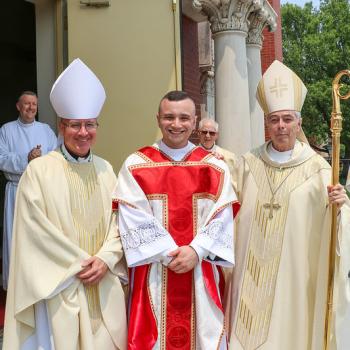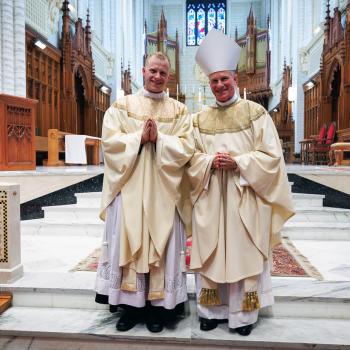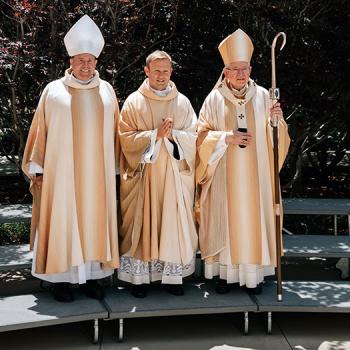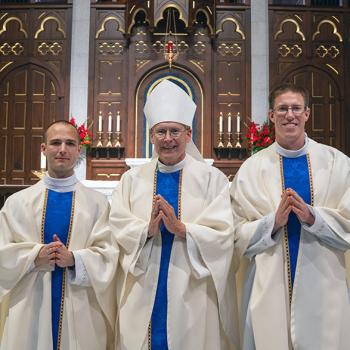
Look, the virgin shall conceive and bear a son,
and they shall name him Immanuel,
which means, “God is with us.” (Matthew 1:23)
Christmas is God’s promise to us, written in flesh and blood, that he’s on our side.
Of the three names given to Jesus at his birth in the Gospel of Matthew–Jesus, Christ, and Immanuel–Immanuel speaks to the heart of the Christmas promise that “God is with us.” The name was first applied in the prophet Isaiah’s own time to speak to king Ahaz’s tenuous political situation during the Assyrian siege of Jerusalem in 701 BC. Isaiah reports that “the heart of Ahaz and the heart of his people shook as the trees of the forest shake before the wind” (Isaiah 7:2). But, said Isaiah, hear the word of the Lord, the child Immanuel will be born, and before he graduates to solid food and can choose right from wrong, the mighty Assyrian siege will be broken. God is with us (7:14-16).
And so it was. The Assyrian siege melted away and the kingdom was preserved for another generation.
Like a lot of prophecies, the coming of Immanuel had a double horizon and a double significance: one in Ahaz’s time, and a second, definitive meaning in the Messiah born of the virgin Mary. While for Ahaz the sign of Immanuel was about God’s presence with the people of Jerusalem over and against the threat to their continued existence, in the coming of Jesus, Immanuel speaks to God’s promise to all humanity. God came into the world. God was clothed in humanity, born in flesh, sent as a sign that he is with us no matter what.
Immanuel is God’s promise to be for and among and with us. God is not over and against humanity. He’s not an enemy or an adversary. Rather, God has crossed over the humanly uncrossable divide to bring us into relationship with him. God has shown us whose side he’s on. Ours.
This is a permanent crossing. God remains with humanity for all eternity. Witness the vision of Revelation, where God is described as having crossed over to make his home “among mortals” (21:3). In this crossing, God is still God, but humanity is no longer humanity. Our human nature has been inflected by God’s presence. His love is available to us in a new way now, and it’s out of that love that we can respond to God’s calling upon our lives to love and know him. Of course, the nature of God’s presence with humanity is such that we are still free to choose against him, to ignore or reject or flee his presence. God-with-us does not compel us-with-God. Nevertheless, God has shown himself to be the kind of God who eternally intends to be on humanity’s side, to seek the good of humanity, to love us beyond what we deserve. It’s God’s willingness to cross over to be with us that makes all the difference.
I think of the 1914 Christmas Truce, poignant still 100 years after the end of World War I. Along some stretches of muddy, frozen trenches, English and German troops on opposing sides of that terrible war began makeshift Christmas celebrations. The Germans stood tiny Christmas trees along the tops of their trenches. The two sides sang Christmas carols–in their own languages, but with mutually recognizable tunes. “Silent Night” mingled with “Stille Nacht” in the frost-heavy air. And then, cautiously, some troops dared pick their way across the barbed wire and grime to meet in the middle with those who were supposed to be their enemies. They wished each other a merry Christmas. They exchanged gifts of cigars and whiskey. And then, as the unofficial truce took hold over several days, a game of soccer was arranged between British and German troops. (The Germans claim to have won, 3-2).
Tragically, the Christmas Truce would not hold. Commanders shifted troops to other fronts to intentionally break up the fraternizing and relationships that had begun to form. But at least for a time, an unimaginable peace took hold in the battle trenches of World War I because of those who were willing to cross over.
Immanuel is God crossing over to humanity. God took the first step, picking his way across the snaggled barbed-wire-divisions that keep us from his love. God reached out. At Christmas, we remember and celebrate that God is with us. The question then becomes: Are we with God?
















